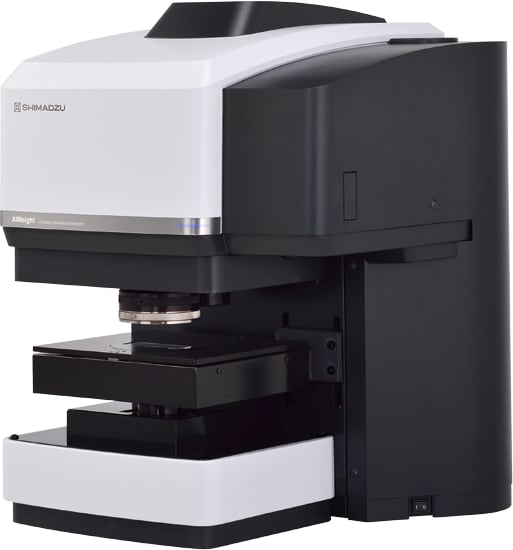AIMsight
Infrared Microscope
Infrared Microscope Maximizes Automation to Improve Microsample Analysis

The AIMsight infrared (IR) microscope is an automatic analysis system that maximizes automation to significantly improve efficiency of microsample defect analysis. This FT-IR microscope accurately measures micro targets by irradiating them with infrared rays, and then gauges the reflectance and transmittance from sample molecules. The AIMsight features several user-friendly functions, such as easy measurement range determination via a wide-field camera, automatic identification of measurement targets, automatic setting of measurement position, and automatic analysis via a contaminant analysis program, assuring that both beginners and specialists can feel confident from the very first analysis.
In addition to trace contaminant analysis and quality control for products such as chemicals, electronics, machinery, and transportation equipment, AIMsight also plays a big role in researching microplastics, tiny plastic particles that have a negative impact on the environment.
AIMsight, the Analytical Intelligence logo, LabSolutions, IRXross, and IRTracer are trademarks of Shimadzu Corporation or its affiliated companies in Japan and/or other countries.
Features
-
Equipped with a wide-field camera and an infrared microscope camera, it is capable of observations up to 10 × 13 mm, while the 330X digital zoom function enables observation of areas as small as 30 × 40 µm.
-
The AIMsight boasts the highest sensitivity in its class with a 30,000:1 S/N ratio. Operators can quickly acquire high-sensitivity data of micro measurement targets down to 10 µm in size. With the automatic contaminant recognition system, the analyst only needs to simply click one button for the software to automatically recognize targets.
-
After the data is acquired, it can be analyzed automatically by a contaminant analysis program equipped as standard. An original library of high hit ratios (optional) for analyzing contaminants in tap water and food products is also available.
-
Videos
-
Infrared Microscope AIMsight
SHIMADZU AlMs to provide analysis systems for all users. An automatic analysis system that can be used with confidence from your first analysis. Equipped as standard with enhanced functionality to support analyses
Downloads
Download the latest brochure.
Applications
| Documents | Date Creation Date |
|---|---|
2024-05-20 | |
2024-04-02 | |
2024-02-06 |
News / Events
-
FTIR TALK LETTER Vol. 43 has been published
The article about the Introduction to the Spectrum Advisor can be used on all Shimadzu FTIR systems controlled by LabSolutions IR. Learn the key points of infrared spectral analysis for aliphatic unsaturated hydrocarbons and aromatics.
-
Analytical Solutions for Microplastics
Shimadzu provides analytical and measuring instruments for the study of a variety of plastic materials: for R&D, characteristic evaluation of raw materials, quality control for plastic products, and deterioration analysis. With these diverse techniques, Shimadzu provides optimal solutions for microplastics research.
-
Shimadzu has released the IRSpirit-X Series
IRSpirit FTIR spectrophotometers are extremely compact, but can still be used with standard accessories from Shimadzu and other manufacturers. IRSpirit instruments come with IR Pilot software, which offers 23 application programs without the need for parameter setup. Measure multiple samples with just a few clicks.
-
Shimadzu has released the MAP-100
The MAP-100 automates the typical steps needed to isolate microplastics. This improves the reproducibility of the analytical workflow, enables lab technicians to focus on other tasks, and makes handling of reagents safer.
-
Latest issue of Shimadzu Journal, featuring Forensics / Toxicology, has come out.
This issue focuses on "Forensics / Toxicology", an area where science and technology are particularly important and needed. It starts with two customer interviews.
-
Cellulose nanofibers
Given that cellulose nanofibers(CNFs)offer attractive physical characteristics, such as light weight, strength, and hardness, they not only enable materials with advanced functionality, but are expected to be used as a reinforcing material that can reduce the weight of composite materials.









